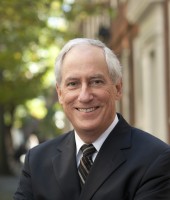Robert Darnton
Robert Darnton is Carl H. Pforzheimer University Professor and Director of the University Library Emeritus, Harvard University. Most of his research concerns the history of books, publishers, censors, booksellers, writers, and readers in eighteenth-century France. The latest of the nineteen books he has written is The Revolutionary Temper, Paris 1748-1789 (to be published in French by Gallimard in 2024), an innovative account of the coming of the French Revolution. Among his awards, he has received a MacArthur Prize Fellowship, a National Book Critics Circle Award, the National Humanities Medal conferred by President Obama, and the Prix Mondial Cino del Duca conferred by the Institut de France. He is a Chevalier of the Légion d’Honneur.
In February 2024, he joins the IAS for a one-month writing residency.
Research Interests
History of books and communication, the social history of ideas, cultural history, the Ancien Régime and the Revolution in France.
“Grub Street Revisited”
In 1971 Darnton published an article, “The High Enlightenment and the Low-Life of Literature,” which provoked a large debate and has since become a standard theme in accounts of the coming of the French Revolution. He argued that an alienated intelligentsia of frustrated writers—“les Rousseau du ruisseau”—in the bottom layers of the literary world produced a seditious literature of pamphlets and libels that undermined the Ancien Régime during its last decades. By exploring this milieu, he challenged the accepted wisdom that the ideological origins of the French Revolution could be traced directly and exclusively to the Enlightenment. The second generation of philosophes, he argued, was integrated in the power structure of the regime and did not challenge its fundamental principles, whereas “Grub Street” hacks called for the overthrow of the entire system. They expressed a spirit of sedition in language that was more passionate than philosophical and that resonated among Jacobins and sans-culottes after 1789, thanks to journalists and orators like Brissot, Marat, and Hébert.
Darnton plans to revise his original argument, taking account of the criticism that has been directed against it and adding criticism of his own. In order to do so, he will draw on fresh research about writers in Paris. Among the questions he will raise are the following: How did contemporaries understand authors and authorship? How many writers were there at different times between 1750 and 1789? Did their population increase, and can one identify those in the bottom ranks? Does the sociological literature about “alienated intellectuals” explain the subversive character of this milieu, or should one invoke social psychology? Aside from the theoretical aspects of the subject, Darnton intends to reread literary sources such as Diderot’s Le Neveu de Rameau and Palissot’s translation of the Dunciad by Alexander Pope.
Finally, he proposes to relate the theme of Grub Street to a general study of writers, which will take the form of a book: The Writer’s Lot in Eighteenth-Century France. Exactly how this can be accomplished depends on the research and reflection he hopes to develop during his month’s stay at the Institut d’études avancées.
Key publications
Robert Darnton, “The High Enlightenment and the Low-Life of Literature in Pre-Revolutionary France,” Past and Present, no. 51 (1971), pp. 81-115.
The Darnton Debate. Books and Revolution in the Eighteenth Century, Haydn T. Mason, ed. (Oxford, 1998). This is a collection of critical essays about Darnton’s work, not a festschrift.
Darrin McMahon, Enemies of the Enlightenment: the French Counter-Enlightenment and the Making of Modernity (New York, 2002).
|
New session of the "Paris IAS Ideas" talk series, with the participation of Robert Darnton, Harvard University / Paris IAS Fellow |
|
|



